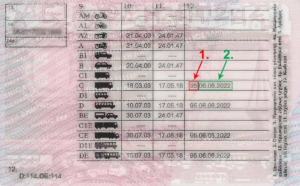CPC Periodic Training, you have to:
get the professional driver of a lorry or bus (who works as a professional driver) and holds a driving licence:
- of C1, C1 + E or C, C + E subcategories from 9 September 2014 onwards and having obtained a Driver’s licence before 9 September 2009.
- of subcategories D1, D1 + E or of categories D, D + E from 9 September 2013 onwards and having obtained a driving license before 9 September 2008.
According to Π.Δ. 74 (ΦΕΚ Α’ 112/18.6.2011) the Certificate of Professional Competence (CPC) is the one that certifies that the particular driver has the required periodic training, according to the provisions of this decree and is therefore allowed to drive a specific or specific categories or subcategories of road or passenger road transport vehicles if it holds a valid driving license for the particular category or particular categories or subcategories.

C1, C1+E, C, C+E
before 10/9/2009
D1, D1+E, D, D+E
before 10-9-2008

Seminar Attendance
35 hours
Attention!
Renewal every 5 years
In order to acquire the CPC Periodic Training:
You should follow the training program of at least 35 hours (or 42 hours for simultaneous training at the CPC for Freight and Passengers) at the Driving School / CPC Center. Which includes the theoretical training of the driver.
After the successful attendance the driving school / Center of CPC will provide the driver with a certificate of successful attendance , which will be submitted to the Transport and Communications Service where his driving license was issued, for the issue of the CPC.
After completing the Periodic training you’ll need:
You should:
- be a greekΑΦΜ holder
- 2 passport type photos (4cm x 6cm)
- you have a Greek Identity or residence or work permit (valid for at least 185 days)
- Own a lorry or bus driving licence
- Publish & pay the following fees (from e-paravolo):
- 30€ (Driver’s license form code 28)
- to have the certificate of successful attendance
- Fill the Diploma Print Application
- Fill the Request Category extension form(Μ-ΤΑΟ02)
Total cost for the procedure : :30€

95. ΧΧ.ΧΧ.ΧΧΧΧ
I see the date behind code 95
Attention!
The licence’s expiry date it’s different from the CPC’s

Are you a new driver?
First qualification CPC (Theory & Practical exams)
Are you an experienced driver?
Periodic CPC (Seminar attendance)
According to Π.Δ. 74 and with the European Directive on “Lifelong Learning for Professionals” depending on whether it is a new driver (for someone who gets now the driving licence of the respective category) or for an old one (in-service driver) CPC is distinguished in:
CPC first qualification (for new drivers) :
CPC first qualification
It is obtained by success in the additional (Driver’s Diploma) Theoretical and Practical Exams and is required to be possessed by those who have acquired or will acquire:
- From 10 September 2009 onwards driving licence of C1, C1 + E subcategories or C, C + E categories
- From September 10, 2008 and then driving licence of subcategories D1, D1 + E or categories D, D + E.
CPC periodic training (for experienced drivers) :
CPC periodic training
You should follow the theory training program of at least 35 hours (without examination) or 42 hours for simultaneous training at the CPC for Freight and Passengers at the Driving School / CPC Center and are obliged having it the drivers:
- (a) C1, C1 + E subcategories or C, C + E categories, from 9 September 2014 onwards and having obtained a driving licence before 9 September 2009.
- (b) subcategories D1, D1 + E or categories D, D + E from 9 September 2013 onwards and having obtained a driving licence before 9 September 2008.
In order to acquire the Certificate of professional competence (CPC) periodic training (either freight or passengers transportation), you must attend 35 hours of theoretical training at the CPC School and obtain the Certificate of Attendance, which you must deposit in the Region of your place of residence.


